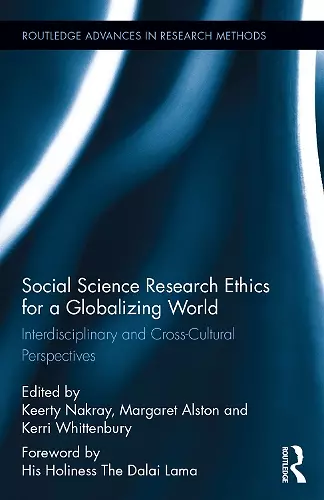Social Science Research Ethics for a Globalizing World
Interdisciplinary and Cross-Cultural Perspectives
Keerty Nakray editor Margaret Alston editor Kerri Whittenbury editor
Format:Hardback
Publisher:Taylor & Francis Ltd
Published:28th Oct '15
Currently unavailable, and unfortunately no date known when it will be back
This hardback is available in another edition too:
- Paperback£41.99(9780367597818)

Research in the humanities and social sciences thrives on critical reflections that unfold with each research project, not only in terms of knowledge created, but in whether chosen methodologies served their purpose. Ethics forms the bulwark of any social science research methodology and it requires continuous engagement and reengagement for the greater advancement of knowledge. Each chapter in this book will draw from the empirical knowledge created through intensive fieldwork and provide an account of ethical questions faced by the contributors, placing them in the context of contemporary debates surrounding the theory and practice of ethics. The chapters have been thematically organized into five sections: Feminist Ethics: Cross-Cultural Reflections and Its Implications for Change; Researching Physical and Sexual Violence in Non-Academic Settings: A Need for Ethical Protocols; Human Agency, Reciprocity, Participation and Activism: Meanings for Social Science Research Ethics; Emotions, Conflict and Dangerous Fields: Issues of “Safety” and Reflective Research; and Social Science Education: Training in Ethics or “Ethical Training” and “Ethical Publicizing." This inter-disciplinary volume will interest students and researchers in academic and non-academic settings in core disciplines of Anthropology, Sociology, Law, Political Science, International Relations, Geography, or inter-disciplinary degrees in Development Studies, Health Studies, Public Health Policy, Social Policy, Health Policy, Psychology, Peace and Conflict studies, and Gender Studies. The book features a foreword by His Holiness The Dalai Lama.
“I am sure many readers will join me in appreciating the efforts of the editors and all the contributors to this book for the dedication and depth of thought they have brought to a wide range of issues that are of concern today.”
- His Holiness The Dalai Lama
"As we struggle to understand, and manage for the best, this globalized world we are creating, it is vital to have rigorous conceptual models backed by empirical evidence upon which to build policy and practice. Nakray’s new edited volume provides just that. It seeks to help us understand why people do what they do, in all its beauty, horror, awe and banality. Vital reading for anyone interested in the why, and not just the how, of our brave new world."
- Peter Walker, Dean, Falk School of Sustainability, Chatham University
"This wide ranging, meticulously researched and timely collection written by leading thinkers and practitioners provides an overview of the ethical challenges of carrying out social science research in cross cultural contexts. But the authors of its seventeen chapters go much further than this - they provide a set of original new insights that will be of enormous interest to any social scientist interested in engaging with the role of research in the 'real world'."
- David Lewis, Professor of Social Policy and Development, London School of Economics & Political Science
"This book is essential reading for anyone doing research on sexual and gender violence, especially in developing economies. It provides first-hand accounts of ethical problems when researchers study sensitive topics, often with vulnerable populations. Among the areas explored are ethics and power relations when Western researchers or ‘outsiders’ conduct research in developing economies; the gendered risks and benefits for participants and researchers in studies of
ISBN: 9780415716222
Dimensions: unknown
Weight: 612g
354 pages